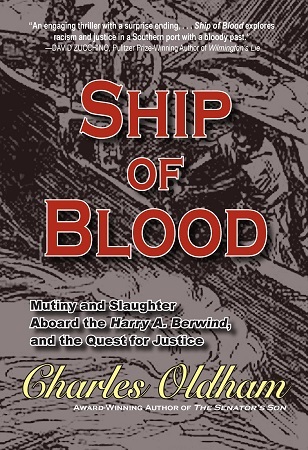New Nonfiction — SHIP OF BLOOD: Mutiny and Slaughter Aboard the Harry A. Berwind, and the Quest for Justice by Charles Oldham

 North Carolina native and lawyer Charles Oldham brings the incredible and unpredictable tale of the Harry A. Berwind to life for the first time.
North Carolina native and lawyer Charles Oldham brings the incredible and unpredictable tale of the Harry A. Berwind to life for the first time.
In October 1905, North Carolina and much of the nation was captivated by the mass murder found aboard the Harry A. Berwind as it sailed the coast of Cape Fear. All four of the ship’s officers had been shot and tossed overboard, one crewman lay dead on the deck, and another was chained hand and foot. The three survivors, Henry Scott, Arthur Adams, and Robert Sawyer, had different stories. Scott claimed other sailors conspired together and restrained him when he would not cooperate; Adams and Sawyer claimed Scott pulled a gun and acted alone until they tackled and restrained him.
The most inflammatory factor that captured the nation: all the murdered officers were white, and the survivors Black.
Just seven years earlier, Wilmington, North Carolina witnessed a brutal white supremacist insurrection that killed dozens of Black citizens in the streets, and by 1905, Jim Crow laws were firmly in place. Predictably, all three survivors were found guilty and sentenced to hang. Yet the legal drama went on, defying all other predictions. Lasting seven years, the case reached the Supreme Court and even presidents Theodore Roosevelt and William Howard Taft. Adams and Sawyer were eventually found innocent and freed.
SHIP OF BLOOD
Author: Charles Oldham
Pub date: February 1, 2022
Publisher: Beach Glass Books
Genre: Nonfiction: True Crime/History
Price: $28.00
ISBN: Hard Cover: 9781736132142
Page count: 272
Amazon
Why Ship of Blood Is an Important Story For Our Time
While working on my second true crime book, Ship of Blood, I had two major themes that kept recurring for me: hope and fear. I introduced the story with fear, and tried to conclude it with hope. My best hope is that the point came across in my writing.
As for fear, it’s part of the geography. The crime is a mutiny and multiplemurder that occurred in 1905 aboard a wooden merchant vessel, the Harry A. Berwind, off the coast of Cape Fear, North Carolina. That name alone gave me a fine lead-in to describe the setting: the bleak, unpredictable, often treacherous sea, beset with storms and other dangers. Then there was the crime itself: five men brutally shot to death by at least one of the ship’s sailors, blood staining the decks. Then add in the fact that all three of the sailors charged with murder were Black, and four of the five victims were white. The specter of race makes the story all the more frightening.
Yet, the story gives us reason for hope. There’s the certain knowledge that we live in better times today, compared with the post-Reconstruction South. And even in the early 1900s, the darkest days of the white supremacist era, this confounding, unpredictable murder trial proves that hope was alive, because justice could and did prevail.
Fear is all too prevalent in our daily lives today. The Covid-19 pandemic is only the most obvious, and most justified, source of it. After the January 6, 2021 riot on Capitol Hill, fears for the survival of constitutional democracy also are very real. Our political discourse is rife with distrust, as it is guided by online algorithms that bring attention to the most extreme, provocative voices.
That is the reason why I look for hope wherever I can, and especially today, it can be found in a surprising number of places. The world is getting better in many ways, as much as our newsfeeds try to convince us otherwise. Health and longevity are on the rise. Racism clearly is not, because people by-and-large are more educated, better informed, and more acculturated than ever before. If you have a job, then you work with, or at least interact with, people of different races every day. Interracial dating and marriage have become so commonplace as to be nearly uncontroversial.
And lynchings certainly do not occur in the United States any longer. That alone is an improvement over the way things were in North Carolina, and especially Wilmington, at the turn of the Twentieth Century.
When those three Black sailors were tried for murder in Wilmington in 1905, it was not long since the infamous Insurrection of 1898 left dozens of Black people lying dead in the city streets. A deviously calculating group of white supremacists led an armed overthrow of the city’s democratically elected biracial government. The Insurrection was intended not only to install a white government, but to terrorize and kill, which it did.
The Wilmington Insurrection is a long-neglected chapter of North Carolina history, and it is only in the past couple of decades that writers have given it the attention that it deserves. It is a disheartening tale of how depravity, violence, race hatred, and most of all fear can lurk in people’s hearts. The more I have learned about it, I have made a point to look for more positive stories from that time period, flickers of hope to assuage the legacy of fear.
I was very pleased, yet completely surprised, to find such a story in the case of the Berwind sailors.
At first blush, the case has all the makings of a judicial lynching. In a city where white supremacists ruled with rifles and hangmen’s nooses, three Black men were put on trial for murdering four whites. The prosecutor himself was a noted white supremacist, and even the attorneys appointed to defend the sailors were part of the oligarchy that led the Insurrection. The jurors, all white, were drawn from the most prejudiced depths of North Carolina’s population.
And yet, the case played out in the most unexpected ways. Reporters for the local newspapers, which had supported the Insurrection not long before, actually listened to the testimony in court. They realized that while one of the sailors really was a psychopathic killer, the other two likely were not, and so they reported. The defense attorneys actually did their jobs, and eventually even some of the leaders of the Insurrection were calling for the two innocent sailors to be set free. They took the case all the way to the Supreme Court, and convinced Presidents Theodore Roosevelt and William Howard Taft — two politicians who had never shown much sympathy towards Black people — to grant them clemency.
Why did the case turn out that way, when it could so easily have ended with a triple hanging? It might seem naïve to think at first, but perhaps because so many people ultimately were moved to do the right thing, just because it was the right thing.
That’s enough to give anyone hope.
About the Author Charles Oldham always felt compelled to write a good story, especially about true crime or North Carolina, where his roots stretch back more than two centuries. Raised by a community college professor and a math teacher, Charles developed a special interest in history and politics early as well as a keen eye for mysteries and details waiting to be explored. This interest led him to a career as an attorney. After graduating from Davidson College and then law school at the University of Georgia, he practiced law in Sanford, North Carolina and served a term as President of the Lee County Bar Association. Charles now resides in Charlotte, where, for ten years, he operated a solo legal practice focused on criminal defense and civil litigation.
Charles Oldham always felt compelled to write a good story, especially about true crime or North Carolina, where his roots stretch back more than two centuries. Raised by a community college professor and a math teacher, Charles developed a special interest in history and politics early as well as a keen eye for mysteries and details waiting to be explored. This interest led him to a career as an attorney. After graduating from Davidson College and then law school at the University of Georgia, he practiced law in Sanford, North Carolina and served a term as President of the Lee County Bar Association. Charles now resides in Charlotte, where, for ten years, he operated a solo legal practice focused on criminal defense and civil litigation.
In his spare time, Charles can be found outdoors—he’s hiked mountains all over the US, from Alaska to Samoa—or spending time with family. Ship of Blood is his second book. His first, The Senator’s Son, was published in 2018. It received several awards, including a Gold Medal from the eLit Book Awards in the true crime category and the North Carolina Society of Historians Book Award, and was a finalist of the International Book Awards’ true crime category and the Book Pipeline Nonfiction Contest.
The post New Nonfiction — SHIP OF BLOOD: Mutiny and Slaughter Aboard the Harry A. Berwind, and the Quest for Justice by Charles Oldham appeared first on Quiet Fury Books.



